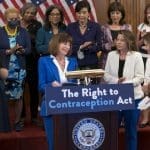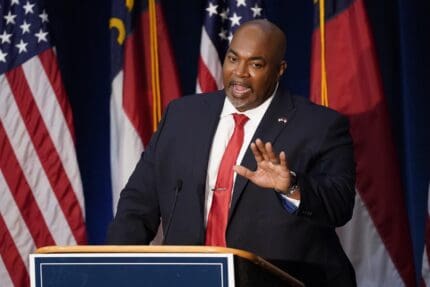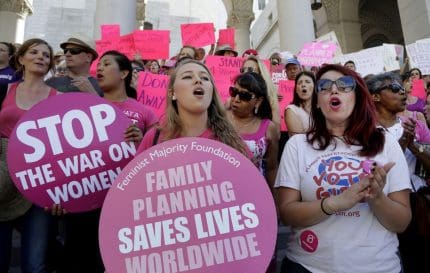Missouri Planned Parenthood clinics remain ‘open to all’ despite new Medicaid restrictions
Planned Parenthood says they will continue offsetting the costs of seeing patients on Medicaid despite a bill signed into law Thursday

Missouri’s Planned Parenthood clinics say they will continue serving patients on Medicaid, even after Gov. Mike Parson signed legislation Thursday blocking state and federal funds from going to the organization.
The new law, which goes into effect Aug. 28, is the third — and Republicans hope final — attempt to end Medicaid reimbursements to any health centers affiliated with abortion providers.
Despite this, Planned Parenthood announced Thursday its clinics will remain “open to all.”
Planned Parenthood clinics in Missouri no longer perform abortions; their affiliates in Illinois and Kansas do. In Missouri, clinics continue to provide services such as contraceptive care, STI testing, cancer screenings and wellness checks.
“Experts have been clear there are not enough providers in the system to absorb the thousands of patients that Planned Parenthood health centers serve,” Planned Parenthood Great Plains and Planned Parenthood St. Louis Region and Southwest Missouri said in a joint statement Thursday.
Parson was flanked by Republican state Rep. Cody Smith of Carthage and Republican state Sen. Mary Elizabeth Coleman of Arnold as he signed the legislation Thursday morning.
“We’ve ended all elective abortions in this state, approved new support for mothers, expecting mothers and children and, with this bill, ensured that we are not sending taxpayer dollars to abortion providers for any purpose,” Parson said in a statement.
Nearly one in five Planned Parenthood patients in Missouri are insured through MO HealthNet, the state’s Medicaid program that serves low-income and disabled citizens and has long banned funding for abortion.
Planned Parenthood also sees more than half of Missouri’s low-income patients seeking family planning services, according to the Missouri Family Health Council Inc.
Democrats argued the legislation would primarily harm low-income Missourians who could be forced to find a new provider through the state’s already strained public health safety net if Planned Parenthood cannot foot the bill for these patients long-term. This could delay critical and potentially life-saving care.
In Missouri, women on Medicaid are 10 times more likely to die within one year of pregnancy than those on private insurance, according to an August multi-year report on maternal mortality published by the Missouri Department of Health and Senior Services.
Missouri is also fighting rising congenital syphilis rates. In the majority of these cases, pregnant mothers had little to no prenatal care, highlighting a larger issue of maternal health care access, the health department noted.
Through an informal survey, the Missouri Family Health Council Inc. found that over the past two years, the wait list for new patients at public health safety net clinics can be weeks or months, and that’s if the provider is taking new patients at all. Meanwhile, wait times at the state’s Planned Parenthood clinics averaged between the same day and three days to get an appointment.
“Other providers cannot absorb the thousands of patients impacted by this ‘defunding’ attack,” Planned Parenthood said in a statement. “For this reason, Planned Parenthood health centers have worked to keep serving MO HealthNet patients at no cost though it is an unsustainable model for a state’s health care system.”
Planned Parenthood clinics in Missouri have been without Medicaid reimbursements for more than two years as prior attempts by Republicans to pass similar restrictions through the state budget were litigated and later struck down in court.
Emily Wales, CEO and president of Planned Parenthood Great Plains, said her organization offset the cost of care for Missouri Medicaid patients during this time through private fundraising.
Both Planned Parenthood affiliates in Missouri have said they plan to continue seeing patients on Medicaid “no matter what.” They have not elaborated on how they plan to afford to do so.
Planned Parenthood on Thursday continues to argue that the latest law is also unconstitutional, and is in violation of federal Medicaid law, which states patients have a right to choose their provider.
A similar law that went into effect in Arkansas several years ago was ultimately upheld by the 8th U.S. Circuit Court of Appeals in St. Louis. Planned Parenthood Great Plains, which oversees that state’s clinics, stopped seeing Arkansas Medicaid patients immediately.
Parson signed the bill near the end of the 15 days he had to do so despite a group of Republican lawmakers attempting to strong-arm him into doing so sooner.
Last month, Senate members of the Missouri Freedom Caucus promised to filibuster the renewal of Medicaid taxes, known as the federal reimbursement allowance, until Parson signed the defund Planned Parenthood bill and until the General Assembly approved a proposed constitutional amendment that would make it more difficult to pass constitutional amendments proposed by voter-led initiatives.
The initiative petition bill and the FRA require a final vote in the Senate before the legislative session ends at 6 p.m. on May 17.
This story was originally published by the Missouri Independent
Recommended

On the one-year anniversary of NC’s 12-week abortion ban, women ready for November
It is rare that women who have had an abortion are willing to share their story, much less step into the spotlight and open up about personal, reproductive decisions.
By Clayton Henkel, NC Newsline - May 17, 2024
Ohio’s congressional Dems demand vote on contraception protection
Democrats from Ohio’s U.S. Congressional delegation want the right to contraception codified into federal law, an effort that’s now in its third attempt on Capitol Hill.
By Susan Tebben, Ohio Capital Journal - May 15, 2024
Veto overrides push Kansas anti-abortion bills into law, while Louisiana seeks to protect IVF
Abortion-related bills continue to be introduced and debated in legislatures across the country, especially in states where the procedure is already banned.
By Kelcie Moseley-Morris, Idaho Capital Sun - May 10, 2024

















































































